Products
Products
Card extraction LC–MS system
Agilent's AACE automated card extraction LC–MS system is an integrated instrument for the analysis of dried blood spots and other dried media. The system is based on the company's 6400 Series triple-quadrupole LC–MS system, and data processing is performed using the company's MassHunter software. According to the company, the system features a shorter overall cycle time from one injection to the next that is achieved by overlapping the extraction step and analytical cycle. Agilent Technologies, Santa Clara, CA;

ICP-MS cone protectors
ConeGuard thread protectors from Glass Expansion are designed to protect threaded ICP-MS interface cones from damaging corrosion. The thread protectors protect the threads while the cones are being cleaned with dilute acid. Versions of the product are available for various cone types from several manufacturers. Glass Expansion, Pocasset, MA;
Filter systems
Ondax's SureBlock notch filters and XLF-Series filter systems are designed to enable capture of Raman spectra in the terahertz spectroscopy regime (10–200 cm-1 or 300 GHz to 6 THz). The filter systems reportedly also capture simultaneous Stokes and anti-Stokes Raman signals up to >500 cm-1 (150 THz) with up to 80% throughput. Ondax, Inc. Monrovia, CA;
Analytical consumables and supplies
PerkinElmer's 2012–2013 Analytical Sciences Consumables and Supplies catalog reportedly lists more than 4000 tested and validated products for atomic spectroscopy, chromatography, and material characterization. The catalog includes products for techniques such as ICP-MS, ICP-OES, and atomic absorption spectroscopy; GC, GC–MS, HPLC, UHPLC, and LC–MS; and FT-IR, FT-NIR, Raman, UV–vis, and fluorescence spectroscopy. PerkinElmer, Waltham, MA;
Circular dichroism spectrometer
The Chirascan-plus automated circular dichroism spectrometer from Applied Photophysics combines simultaneous circular dichroism, absorbance, and fluorescence detection for biotherapeutic development and comparison. Applications include formulations, biosimilarity, drug discovery, and protein engineering. Applied Photophysics, Surrey, UK;
Miniature infrared polarizers
ProFlux SIR infrared polarizers from Moxtek are designed to combine the qualities of silicon substrates with antireflective coatings for broadband applications. Moxtek, Orem, UT;
www.moxtek.com/optics-products/ir-polarizers.html
Tunable light sources
Tunable light sources from optometrics are intended for use in studying wavelength-dependent chemical, biological, and physical changes or properties. They can also be used in color analysis and reflectivity measurements of products for aesthetic purposes. An automated version includes a scanning digital monochromator, a lamp, and a control box and software. A manual version includes a digital monochromator, a lamp, and a power supply. Optometrics Corp., Ayer, MA;
UV–vis–NIR detector
The Syncerity 1024 X 256 CCD detector for UV–vis–NIR spectroscopy from Horiba Scientific is designed as a research-grade spectroscopy camera for OEM and research applications. The instrument reportedly provides a slow scan speed of 45 kHz, a dynamic range of 92.5 dB in image mode, readout noise and nonlinearity of <0.4%, and TE cooling to -60 °C. According to the company, the instrument is intended for low-light-level detection in spectroscopic applications where ultimate deep cooling is unnecessary. Horiba Scientific, Edison, NJ;
Certified pH buffers
Certified pH buffers with pH values ranging from pH 2 to pH 10 are available from SPEX CertiPrep. The buffers are supplied packaged in 500-mL bottles. The company reportedly is accredited by UL DQS for ISO 9001 and by A2LA for ISO 17025 and ISO Guide 34. SPEX CertiPrep, Metuchen, NJ;
Performance validation software
An application note from Shimadzu describes how the company's performance validation software conforms to testing stipulated by the Japanese Pharmacopoeia, European Pharmacopoeia, and US Pharmacopeia, and provides an example of instrument validation. Shimadzu Scientific Instruments, Inc., Columbia, MD;
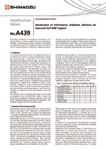
XRF kit
Amptek's XRF Kit is designed to help users begin performing elemental analysis via X-ray fluorescence. According to the company, the kit includes the company's X-123 complete spectrometer with an SDD or Si-PIN detector; a mini-X USB controlled X-ray tube; XRF-FP QA software; a mounting plate; and a test sample. Amptek Inc.,Bedford, MA;
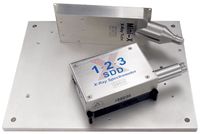
Miniature spectrometer
B&W Tek's Exemplar miniature spectrometer features on-board data processing that includes averaging, smoothing, and automatic dark subtraction. According to the company, the instrument provides data transfer of 900 spectra/s, trigger delay of 14 ns, and gate jitter of ±1 ns. B&W Tek, Newark, DE;
www.bwtek.com/product/spectrometer/exemplar.html
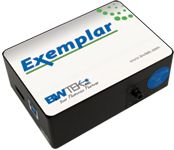
Spectroscopy software
Version 9.5 of Bio-Rad's KnowItAll spectroscopy software is designed to provide scientific researchers with features for database building and management, search, analysis, structure drawing, and reporting. Enhancements reportedly include improved spectral searching capability, the choice of mixture analysis algorithm, spectral viewing from different x-axis zoom zones and improved reflectance spectrum handling, expanded ability to create macros, a structure drawing feature that enables users to flip fragments in a molecule, and improved search speed, and an improved search interface. Bio-Rad Laboratories, Inc., Hercules, CA;
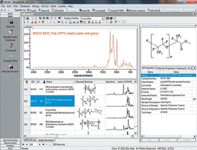
ICP-MS system
The NexIon 300 ICP-MS system from PerkinElmer features three modes of operation, three cones, and three quadrupoles. The modes of operation are standard, collision, and reaction, and the cone types are sampler, skimmer, and hyper skimmer. PerkinElmer, Waltham, MA;
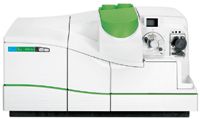
Topographic Raman imaging
WITec's True Surface Microscopy imaging mode is designed to allow large-area topographic coordinates from the profilometer measurement to be precisely correlated with the large-area confocal Raman imaging data. This option reportedly enables samples that would normally require extensive preparation to obtain a certain surface flatness to be automatically characterized as they are. According to the company, it allows scan ranges as large as 50 mm × 100 mm with a spatial resolution of 100 nm vertically and 10 μm laterally. WITec GmbH, Ulm, Germany;
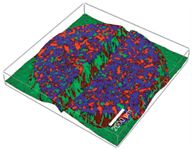
ICP-MS system
Thermo Fisher Scientific's iCAP Q ICP-MS system is designed to provide increased throughput to enable laboratories to cut analysis times by up to 50%. According to the company, the system features an interface that enables one-click setup and allows users to go from standby to performance-qualified analysis with the push of a button. Thermo Fisher Scientific, Inc., San Jose, CA;
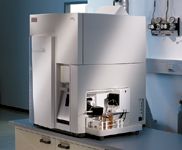
Diode source
Horiba's DeltaDiodes diode source is designed to use laser diode and LED technology to generate short optical pulses down to 50 ps with repetition rates up to 100 MHz over a range of wavelengths. According to the company, the system has a USB interface and hot-swappable, plug-and-play heads. Horiba Scientific, Edison, NJ;
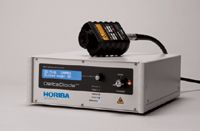
Raman analyzers
The ProRaman-L series Raman spectrometers from Enwave Optronics are designed to provide measurement capability down to low parts-per-million levels. According to the company, the instruments are suitable for process analytical method developments and other measurements requiring high sensitivity and high speed analysis. Enwave Optronics, Inc., Irvine, CA;
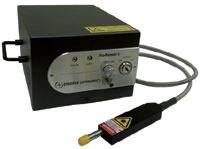
Raman microscope
Renishaw's inVia Raman microscope is designed with a 3D imaging capability that allows users to collect and display Raman data from within transparent materials. According to the company, the instrument's StreamLineHR feature collects data from a series of planes within materials, processes it, and displays it as 3D volume images representing quantities such as band intensity. Renishaw, Hoffman Estates, IL;
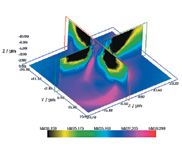
Cyclone mills
Retsch's laboratory mills are designed for use with temperature-sensitive samples. According to the company, the Twister rotor mill has an integrated cyclone and the Ultra Centrifugal Mill ZM 200 can be optionally equipped with a cyclone and collecting vessels of various sizes. Retsch GmbH, Haan, Germany;
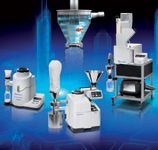
FT-IR microscope
The Lumos stand-alone FT-IR microscope from Bruker Optics is designed for visible inspection and infrared spectral analysis. According to the company, all internal moveable components are motorized and the instrument's software guides operate stepwise through the process of data acquisition. Bruker Optics, Billerica, MA;
www.brukeroptics.com/lumos.html
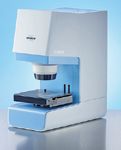
Spectroscopy products online
IR-transparent windows, disks, window holders, and KBr products are available for on-line purchase from PIKE Technologies. According to the company, its Premier Stock window and crystal materials provide a range of IR-transparent materials frequently used by IR spectroscopists. UV–vis and NIR cuvettes and vials are also available. PIKE Technologies, Madison, WI;
Elemental analysis of clay
An application note from Rigaku describes the use of the company's NEX QC energy dispersive X-ray fluorescence analyzer for analysis during the QA/QC process in the production of clay-based products. According to the publication, the analyzer's filtered direct excitation design enabled the effective analysis of titanium and iron in kaolin clay. Applied Rigaku Technologies, Austin, TX;
Microvolume UV spectrophotometer
Shimadzu's BioSpec-nano spectrophotometer is designed for fast, reproducible concentration determination of nucleic acids and proteins. The instrument reportedly requires a sample volume of 1 μL (0.2-mm pathlength) or 2 μL (0.7-mm pathlength), which is pipetted onto its measurement plate. No standard rectangular cell is needed, although a rectangular cell adapter is available. According to the company, sample mounting, measurement, and cleaning are performed automatically by the instrument, and measurement time is 3 s. Shimadzu Scientific Instruments, Columbia, MD;
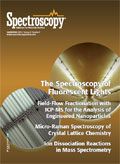
LIBS Illuminates the Hidden Health Risks of Indoor Welding and Soldering
April 23rd 2025A new dual-spectroscopy approach reveals real-time pollution threats in indoor workspaces. Chinese researchers have pioneered the use of laser-induced breakdown spectroscopy (LIBS) and aerosol mass spectrometry to uncover and monitor harmful heavy metal and dust emissions from soldering and welding in real-time. These complementary tools offer a fast, accurate means to evaluate air quality threats in industrial and indoor environments—where people spend most of their time.
NIR Spectroscopy Explored as Sustainable Approach to Detecting Bovine Mastitis
April 23rd 2025A new study published in Applied Food Research demonstrates that near-infrared spectroscopy (NIRS) can effectively detect subclinical bovine mastitis in milk, offering a fast, non-invasive method to guide targeted antibiotic treatment and support sustainable dairy practices.
Smarter Sensors, Cleaner Earth Using AI and IoT for Pollution Monitoring
April 22nd 2025A global research team has detailed how smart sensors, artificial intelligence (AI), machine learning, and Internet of Things (IoT) technologies are transforming the detection and management of environmental pollutants. Their comprehensive review highlights how spectroscopy and sensor networks are now key tools in real-time pollution tracking.